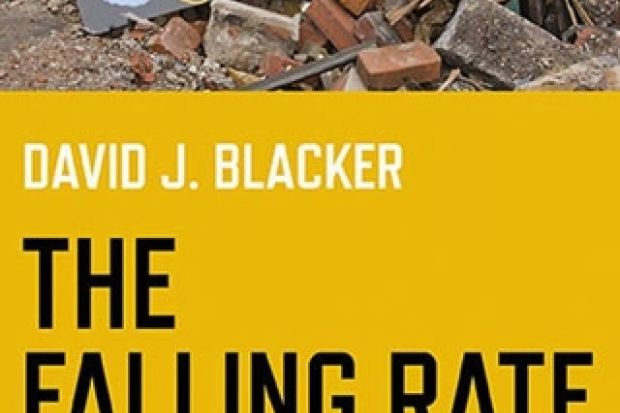“Neoliberalism of the academy”: in the UK, this ubiquitous phrase takes in the multimillion-pound student loan book sell-off, the introduction of £9,000-a-year tuition fees, the silencing of student dissent on campus, the research excellence framework and the research assessment exercise, citation indexes and even the increasing focus on graduate employability. Here, US academic David Blacker charts what neoliberalism means for education, arguing that its chief impact lies not in the restructuring of the economic conditions for universities, but in its drive to eliminate education as a universal and public good. This argument is drawn by analogy from Karl Marx’s “tendency of the rate of profit to fall”, essentially the way that capitalism, through the longue durée of technological innovation, investment and productivity gains, begins to bleed profits.
Blacker has in his sights the confusing of education with financial investment – by either individuals or society – in the gaining of skills demanded by the job market. Countries desire a labour force with training in literacy, numeracy and IT – and need science, technology, engineering and mathematics graduates in particular – in order to compete globally. Yet there are now fewer jobs going, and poorer ones at that – less fulfilling, less well paid, more insecure – which disproves the Clintonian lie that if they work hard and play by the rules, graduates will “get on”. The austerity marketplace seeks graduates with a wholly different set of skills than the Keynesian one but, crucially, it also wants fewer of them.
This, then, is the falling rate of learning. The usefulness for industry of universal public education, emerging hand-in-glove with industrial society and enfranchisement from the late 18th century, has gone. The rewards for state and business of cutting back on such education provision, in an age of austerity, are overwhelmingly appealing – hence Blacker’s characterisation of the neoliberal endgame for education.
Its Marxist perspective means the book offers a structuralist reading of the changes that education is undergoing in the Western world. Blacker allows room for the committed, innovative educator (as you, reader, will no doubt be), capable of motivating students, transforming life chances and inspiring a lifelong love of learning. Yet he sees the landscape shifting to one in which elites are raising the drawbridge (financially if not literally) on funding for public education. He draws out three areas where this occurs: eye-watering levels of student debt, curbs on freedom of speech and the increasing differentiation in formerly universal education provision. Although the book is written from an American perspective and draws on US examples, many British analogies will be apparent.
This is a punchy, polemical book and good knockabout stuff, excoriating the individual culpability of greedy bankers and, in our sector, the CEO-style university leaders awarded inflation-busting pay rises. Blacker gleefully calls for the jailing of bankers for criminality, but the merit in his argument lies in its far deeper analysis of the “ailing production process”. For all the moral probity on university committees, for all the radical transformative pedagogy taught in lecture and seminar rooms, there remain structural economic and ideological forces directing the play from behind the scenes. Blacker calls our universities the “cold impersonal system”, the “machine”. This is a book that is not only unsparing but a rousing call to arms. It could be a vital tool in understanding the processes under way in UK higher education, namely those that Stefan Collini recently accused of turning “first-rate universities into third-rate companies”.
The Falling Rate of Learning and the Neoliberal Endgame
By David J. Blacker
Zero Books, 319pp, £15.99 and £6.99
ISBN 9781780995786 and 5793 (e-book)
Published 13 December 2013
Register to continue
Why register?
- Registration is free and only takes a moment
- Once registered, you can read 3 articles a month
- Sign up for our newsletter
Subscribe
Or subscribe for unlimited access to:
- Unlimited access to news, views, insights & reviews
- Digital editions
- Digital access to THE’s university and college rankings analysis
Already registered or a current subscriber? Login





